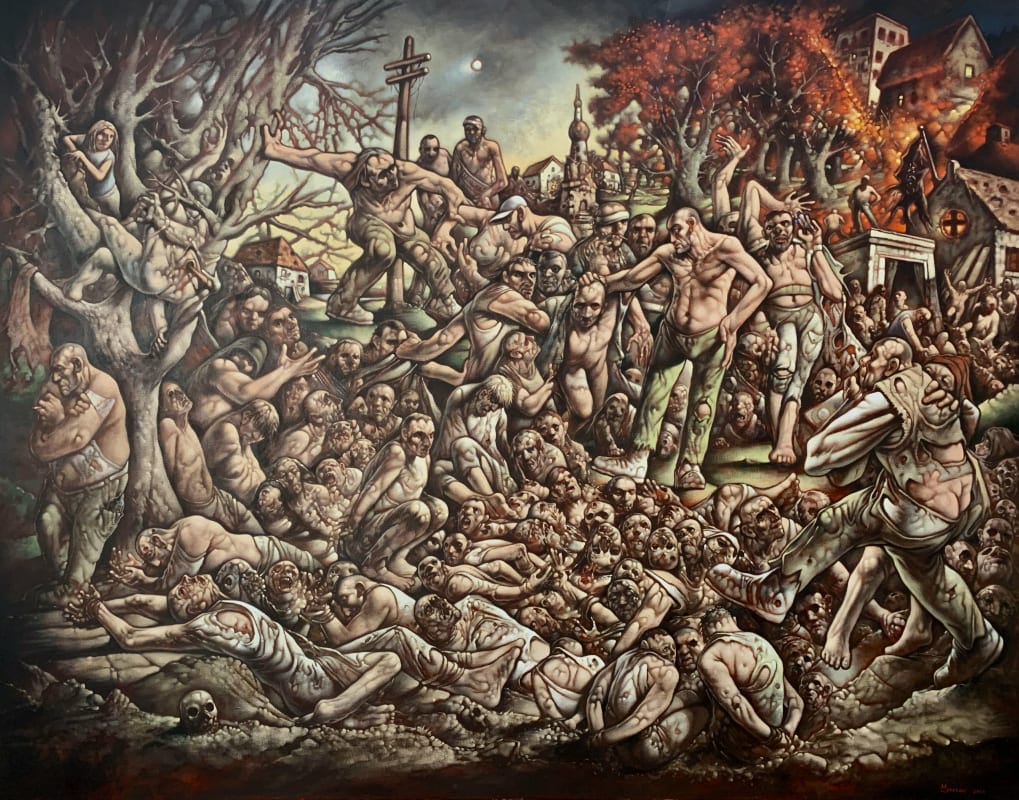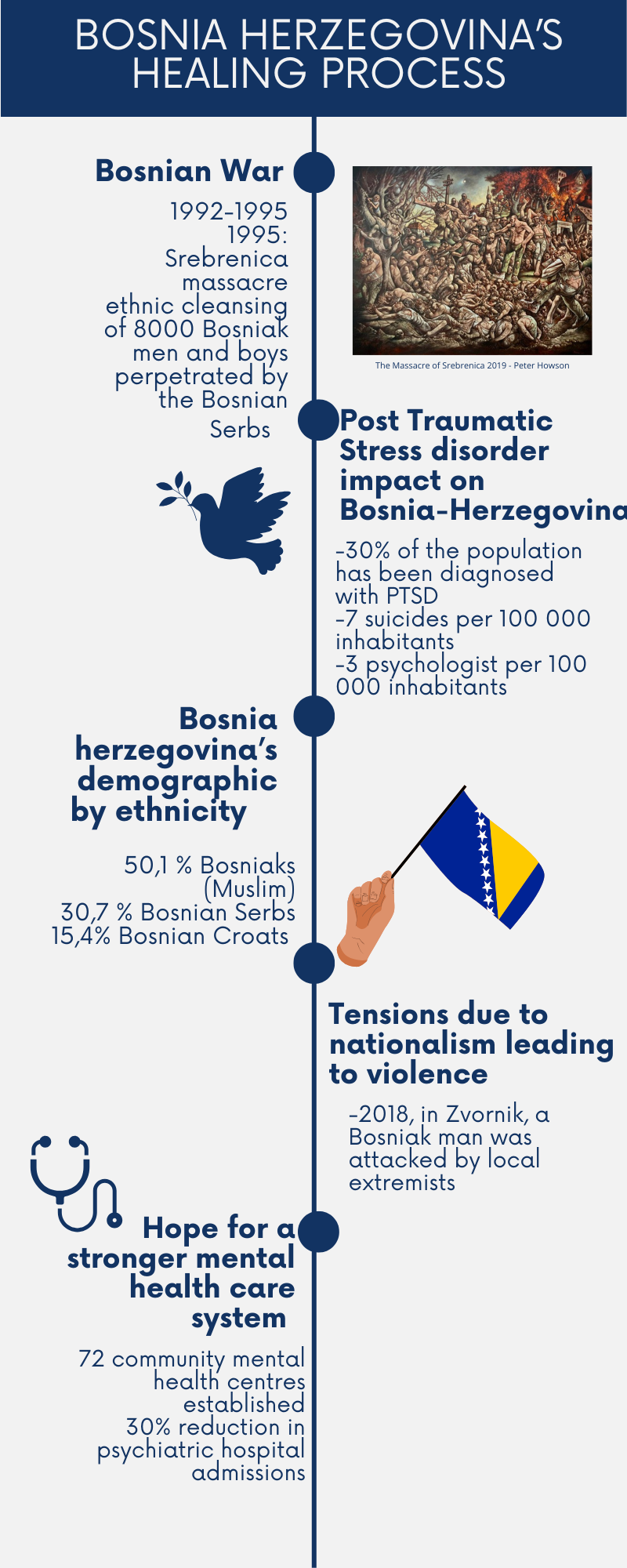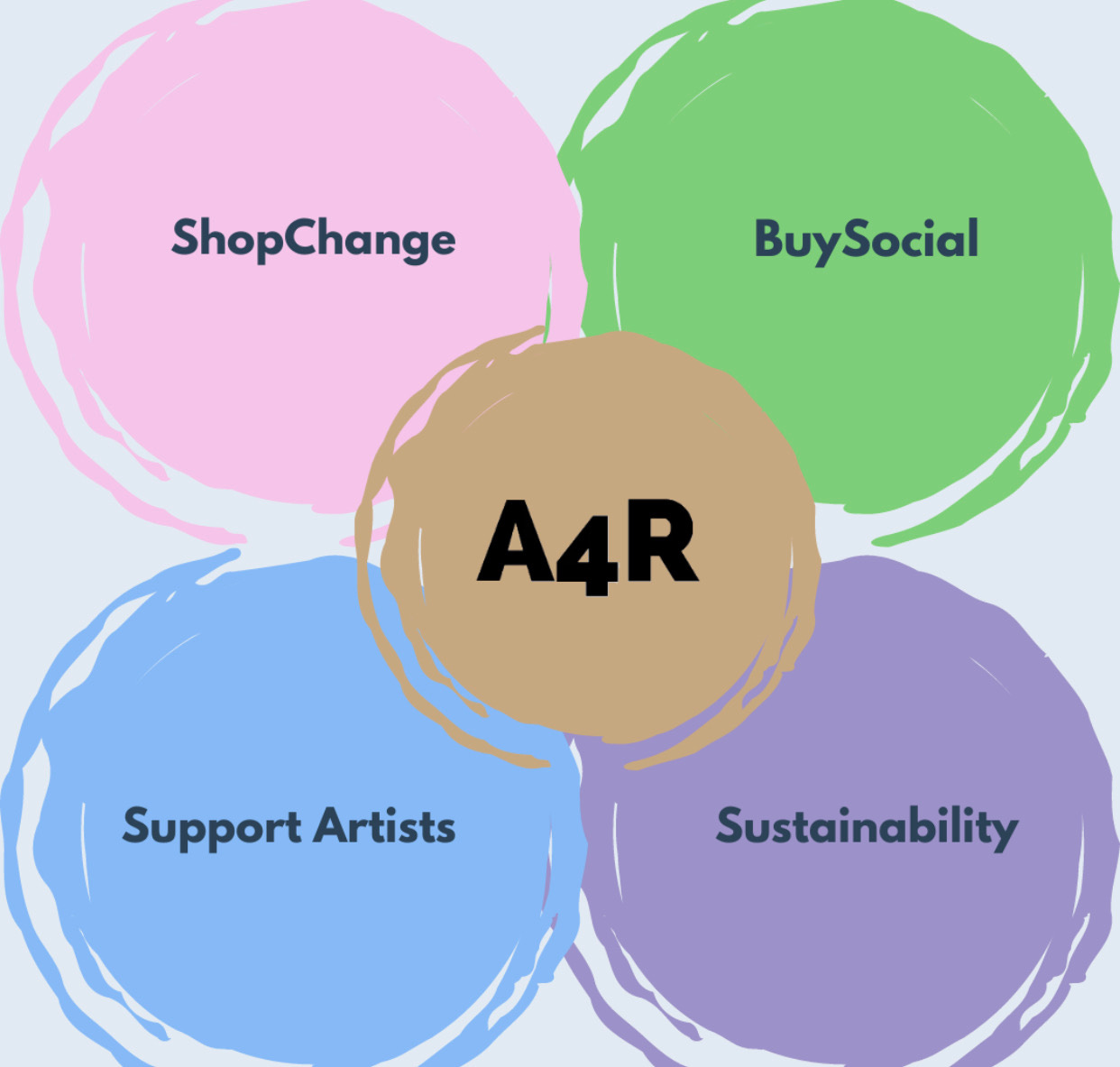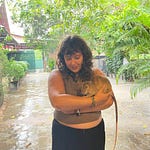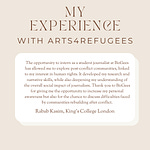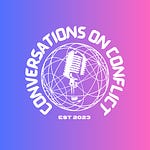How Post Traumatic Stress Disorder Still Shapes Bosnia-Herzegovina 30 Years After the War ?
The War That Left Deep Scars
From 1992 to 1995, Bosnia and Herzegovina endured a brutal war fuelled by ethnic nationalism, resulting in mass atrocities such as the Srebrenica massacre, ethnic cleansing, and sexual violence. These events left lasting trauma, with PTSD (post-traumatic stress disorder) still affecting survivors and younger generations who have inherited the psychological burden. Today, PTSD is not just an individual struggle, it affects families, communities, and even the country’s political and economic stability. By analysing historical narratives, personal testimonies, and clinical studies, we explore how trauma has shaped post-war Bosnia and continues to impact its ability to meet the seven human needs established by the United Nations: health, safety, social connections, self-fulfilment, security, economic stability, and freedom.
Historical Roots of PTSD in Bosnia
“The hate didn’t exist before; it was artificially installed. National and religious identities are openly used as weapons in the political arsenal.” – Vedran Grahovac, Prijedor
To understand the ongoing effects of PTSD, we need to look at Bosnia’s long history of ethnic and political conflict. Centuries of Division: Nationalist narratives, such as the Serbian myth of Prince Lazar’s sacrifice against the Ottomans, fuelled the idea that Muslims (now Bosniaks) were historical oppressors. These myths resurfaced in the 1990s to justify ethnic violence. During World War II, The Ustaše, a Croatian fascist regime, carried out mass killings of Serbs, deepening ethnic hatred. After Tito’s death, Yugoslavia collapsed, nationalism surged, leading to the Bosnian War, where historical grievances justified mass violence. The psychological impact of these conflicts didn’t end in 1995; it continues to shape how people view themselves and each other, preventing true reconciliation.
What is PTSD and Why Does It Still Matter?
PTSD is a mental disorder triggered by traumatic events, causing symptoms like flashbacks, anxiety, emotional numbness, and difficulty trusting others. About 30% of people exposed to the Bosnian War still suffer from PTSD, according to clinical studies.The effects of PTSD extend beyond the individual: Intergenerational Trauma: Children of war survivors may inherit heightened stress responses, even if they didn’t experience war firsthand. Research (Yehuda & Bierer, 2009) suggests trauma can alter gene expression, making future generations more vulnerable to anxiety and depression. Social Disconnection: PTSD disrupts the ability to form healthy relationships, increasing isolation and ethnic distrust.
How PTSD Impacts the Seven UN Human Needs
Health: Bosnia’s mental health system is underfunded. The WHO reports that mental health spending is less than 2% of the total health budget, and there are only 9 psychiatrists per 100,000 people. Many people, especially in rural areas, have no access to mental health care.
Safety: PTSD fuels ethnic tensions, which have led to sporadic violence. In 2018, in Zvornik, a Bosniak man was attacked by local extremists, a case reflecting how unresolved trauma can trigger ethnic-based violence.
Social Connections: War trauma has deepened ethnic divisions, making it harder for Bosniaks, Serbs, and Croats to rebuild trust. PTSD makes it difficult for survivors to form meaningful relationships, isolating them further.
Self-Fulfillment: PTSD hinders personal growth, making it difficult for individuals to pursue education and career goals. Studies show that many war survivors struggle with motivation and emotional regulation, limiting their potential.
Security: The Dayton Peace Agreement (1995) stopped the violence but divided the country into two entities: the Serb-majority Republika Srpska and the Federation of Bosnia and Herzegovina (home to Bosniaks and Croats). This system reinforced ethnic separation rather than promoting unity. PTSD keeps the war’s memory alive, reinforcing mistrust in political institutions.
Economic Stability: PTSD affects job performance and employment rates. Many survivors struggle with concentration and motivation, limiting their career prospects. Economic instability also prevents younger generations from leaving their war-torn towns in search of better opportunities.
Freedom: Fear, anxiety, and nationalist rhetoric continue to limit personal freedoms. Many young people in Bosnia feel trapped in a country still defined by its past, struggling to move forward.
How Art Helps Heal Trauma
Art has become a powerful way for survivors to cope with PTSD. Scottish painter Peter Howson, who documented the Bosnian War, has used his paintings to process his own PTSD while raising awareness about war trauma. His raw, emotional depictions of suffering serve as a visual reminder of Bosnia’s pain while offering an outlet for collective healing.
The Massacre of Srebrenica 2019 - Peter Howson
The Role of International Organisations in PTSD Recovery
Several global organisations are working to address PTSD in Bosnia: World Health Organisation (WHO): Works with Western Balkan governments to improve mental health care and introduce community-based mental health services (WHO, 2022). International Committee of the Red Cross (ICRC): Provides psychosocial support programs for war-affected populations (ICRC, 2024). UNICEF: Focuses on mental health programs for young people, helping children of war survivors cope with inherited trauma. Bosnia has also established 72 community mental health centres, which have helped reduce psychiatric hospital admissions by 30% (PMC, 2019).
The COVID-19 Pandemic: A Setback for PTSD Recovery
The pandemic worsened PTSD symptoms for many Bosnians. Lockdowns, financial instability, and reduced healthcare access triggered traumatic memories for war survivors. A 2021 study by Dizdarević and Grebo found increased PTSD symptoms, depression, and suicidal ideation among Bosnian war survivors during the pandemic. WHO also reported that Bosnia lacked a national suicide prevention plan, further exacerbating the crisis.
Can Bosnia Heal?
Healing from PTSD requires more than just medical treatment, it demands social reconciliation, economic recovery, and mental health awareness. Thirty years after the war, PTSD continues to affect Bosnia at every level: personal, social, and political. The scars of the past are visible in the way people interact, the structure of the country’s government, and the deep economic struggles that persist. However, efforts by international organisations, mental health advocates, and artists offer hope. With increased mental health support, education, and interethnic cooperation, Bosnia has the potential to move beyond its painful past and create a future built on healing, resilience, and unity.
In this episode Venus discusses Bosnia and the mental health issues of PTSD they are dealing with in rebuilding themselves. She is a Citizen Journalist with us on a placement organised with War Studies Department, King’s College, London. This article was edited using Lex.page.
Thank you for reading an A4R 🎨 Post. Don’t forget to visit our gift shop here. Every purchase scales our impact and pays our bills.



